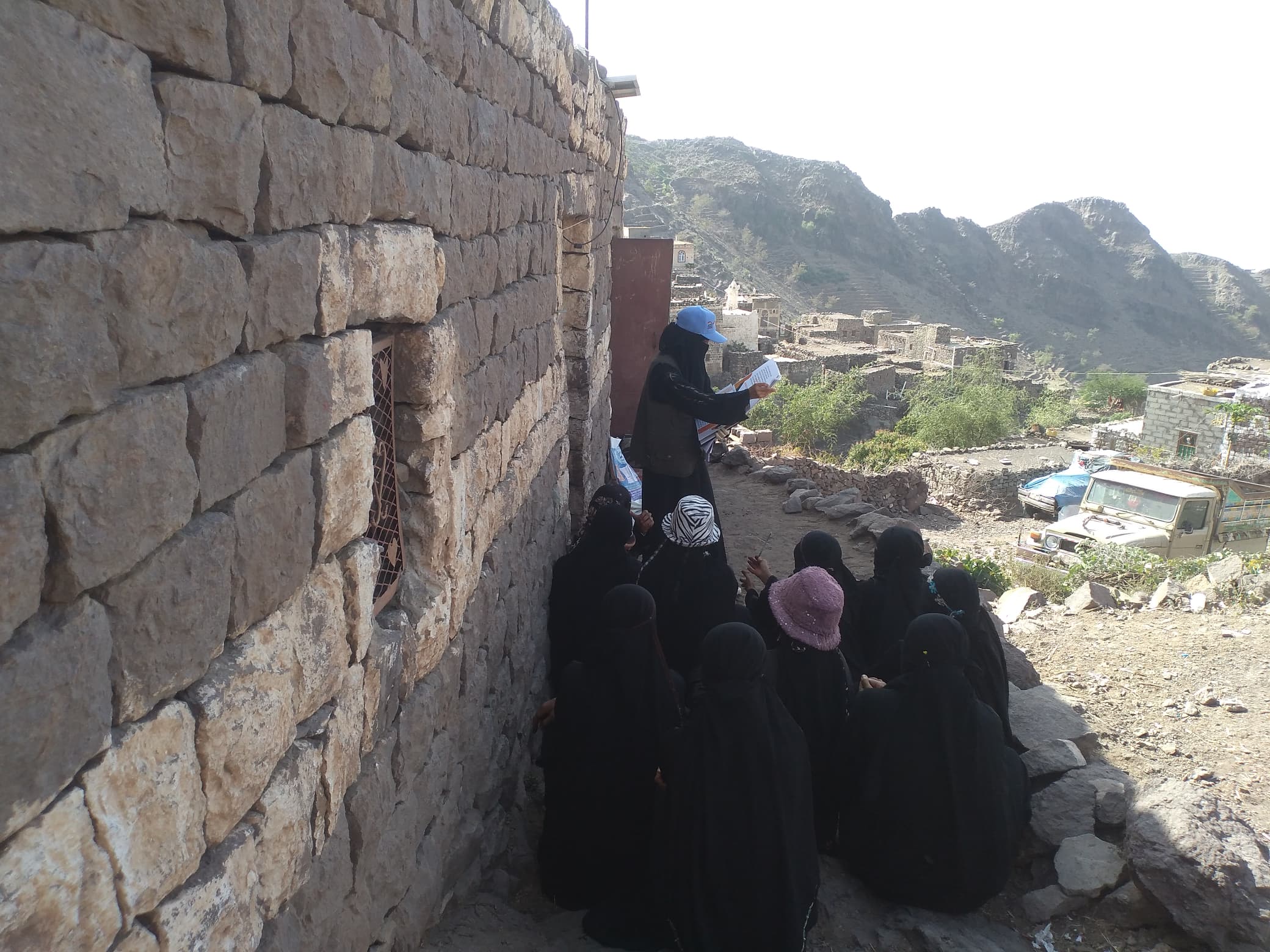Dust swirled around Khawlah’s feet as she navigated the winding paths of Utomah, a remote sub-district of Bani Sa’ad district, Al Mahwit Governorate, northwestern Yemen. On her shoulder, a canvas bag carrying not just hygiene supplies, but also hope. Khawlah is not just a midwife, she is a champion armed with knowledge, a guardian of health and hygiene promotion in a community struggling for survival.
At least 17.4 million people are in need of water, sanitation and hygiene (WASH) assistance in 2024. An estimated 700,000 people are facing catastrophic conditions to access WASH services, mainly in remote districts from Lahj, Hajjah, Sa’dah and Al-Mahwit. In these districts, 25 per cent or more of households are living in areas where there is a total collapse of ability to meet relevant WASH standards. The likelihood of outbreaks of diseases, both waterborne and airborne, is high due to the damaged and insufficiently maintained WASH infrastructure, recurrent floods and limited access to safe water.
As a WASH volunteer with CARE, Khawlah’s mission extends beyond the delivery room. “I deliver awareness messages such as treating and preserving water, hand washing with water and soap, personal hygiene, how to keep the home and surrounding environment clean and purified and putting a stop to outdoor defecation,” she explains. “We face difficulty in delivering these messages especially to illiterate elders, but we do the best of our ability to override this issue by getting more in touch with them to deliver these messages. Not only were they receiving the messages, they were also inspired! We definitely felt the impact of our messages in behaviour changes as we continuously monitored the work throughout several phases.”
Engagement with the communities is made possible by strengthening the capacity of community hygiene promoters (CHPs). Upon receiving the necessary training, the CHPs reach out to community members with awareness raising efforts on improved hygiene practices, including prevention of COVID-19. This has resulted in significant reduction of diseases (including waterborne) and improved health conditions considerably. The efforts by CHPs will also help the local communities to identify and detect the signs and symptoms of COVID-19 and be able to protect themselves and others by practicing safety procedures such as social distancing, hand hygiene, and avoiding crowded areas. The hiring and training of local CHPs has potential longer-term impact as they will stay in the same communities and will therefore be expected to provide awareness even beyond the project life.
This change has deeper roots. “Selecting volunteers from the targeted community is a useful tool,” Khawlah emphasizes. “The volunteers know the community’s ways around better than anyone else from outside the community. They know when to go and deliver these messages. If the volunteers are from outside the community, they would not have the ability to communicate and understand the community mentality, let alone the dialect barrier. We are from the community, and we know how to communicate with our community with no problem whatsoever.”
In light of this, CARE delivered a project – Improving Food Security, Income Opportunities and Health Protection for the Conflict-affected Population in Al Mahwit and Hajjah, Yemen – funded by the German Ministry of Foreign Affairs (GMOFA) to raise the hygiene awareness messages in Milhan and Bani Sa’ad districts in Al-Mahwit Governorate and Ash Shaghadirah district of Hajjah Governorate. In total, 16 community hygiene promoters (6 females and 6 males) were trained to disseminate hygiene messages to locals in the targeted districts. Khawla’s activity aims to improve access of the crisis-affected populations to clean drinking water and to prevent the spread of waterborne diseases and improve public health and resilience. In addition, the project also aims at creating awareness among the masses about improved hygiene practices including combating the spread of waterborne diseases and nutrition messages. The awareness raising is conducted through trained Community Hygiene Promoters, broadcasting messages via local radio channels, and conducting cleaning campaigns. The cleaning campaigns will be conducted jointly with the Cleaning Fund in internally displaced people (IDP) sites or areas with a high concentration of displaced population. In total, this objective benefits 98,906 individuals across the three districts.
“We aspire for the families to move from such darkness to the light of education and awareness. We need the knowledge to be passed on in the families,” she states. “If someone raised my parents’ awareness, they will go spreading the knowledge in the community, and so on.”
“As for my own aspirations as a midwife, I wish to relieve the suffering of my community. Imagine that we don’t even have a health unit! Women face delivery complications and need to trek long and risky journeys to the nearest health facility. Some don’t have the car fees to be able to go to deliver their babies. I wish that a health facility could be established where I can work in and help serve women to have safe delivery, to reduce their pain. That is my own dream. This is what I wish for all along.”


